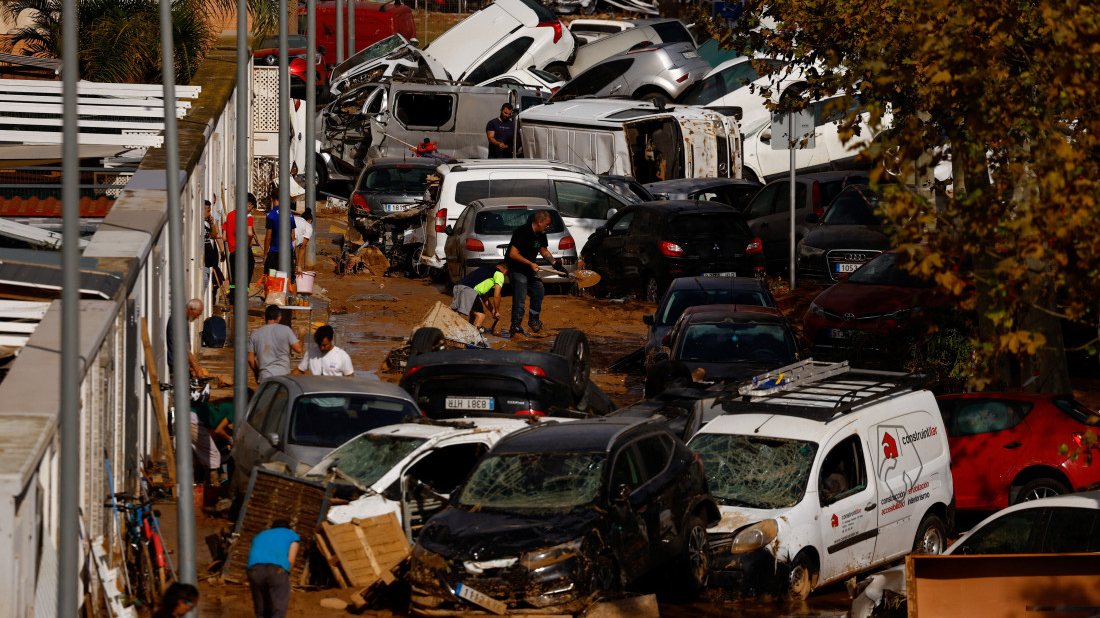AnewZ on the ground: World leaders gather in Munich as transatlantic tensions dominate
AnewZ's Orkhan Amashov reports from Munich as the three-day Munich Security Conference kicked off on Friday (13 February), bringing together world lea...

Hundreds of residents of a Valencia suburb particularly badly hit by last week's deadly floods protested on Sunday during a visit by Spanish King Felipe and Prime Minister Pedro Sanchez, with some throwing mud at them.
Chanting "Murderers, murderers!" they vented pent-up anger over what has been widely perceived by local residents as tardy alerts from the authorities about the dangers of Tuesday's storm and flooding in the Valencia region, and then a late response by the emergency services when disaster struck.
"It was known and nobody did anything to avoid it," a young man told the king, who insisted on staying on to talk to the people despite the turmoil, while the prime minister had withdrawn.
At one point in the visit to the stricken suburb of Paiporta Felipe held a man who was crying on his shoulder.
The central government has said issuing alerts to the population is the responsibility of regional authorities. The Valencia authorities have said they acted as best as they could with the information available to them.
Sanchez said on Saturday that any potential negligence would be investigated later.
The death toll from the country's worst flash floods in modern history edged higher to 217 on Sunday - almost all in the Valencia region and over 60 of them in Paiporta alone. Dozens of people were still unaccounted for, while some 3,000 households still had no electricity, officials said.
Thousands of additional troops and police joined the disaster relief effort over the weekend in the largest such peacetime operation in Spain.
The floods engulfed streets and lower floors of buildings, and swept away cars and bits of masonry in tides of mud.
The tragedy is already Europe's worst flood-related disaster in a single country since 1967 when at least some 500 people died in Portugal.
Scientists say extreme weather events are becoming more frequent in Europe, and elsewhere, due to climate change. Meteorologists think the warming of the Mediterranean, which increases water evaporation, plays a key role in making torrential rains more severe.
Europe heads into the Munich Security Conference, on Friday (13 February), amid deepening unease over U.S. policy, as President Donald Trump’s hard-line stance on defence, trade and territory fuels doubts about Washington’s long-term commitment to transatlantic security.
James Van Der Beek, who rose to fame as Dawson Leery in the hit teen drama Dawson’s Creek, has died aged 48 following a battle with stage 3 colorectal cancer.
Stalled U.S.–Iran talks and mounting regional tensions are exposing a growing strategic rift between Washington and Tel Aviv over how to confront Tehran, political analyst James M. Dorsey says, exposing stark differences in approach at a critical moment.
Türkiye and Greece signalled renewed political will to ease long-standing tensions during high-level talks in Ankara on Wednesday (11 February). Maritime borders, migration and trade topped the agenda as both leaders struck a cautiously optimistic tone.
BMW is recalling a mid six figure number of vehicles worldwide after identifying a potential fire risk linked to the starter motor.
As Cuba’s government prepares for American aggression, residents say economic hardship worries them more than the threat of war. Tensions between Cuba and the U.S. have escalated sharply this year, as Washington steps up sanctions and threatens regime change.
Europe needs to develop global partnerships with key nations to tackle global problems together, chancellor tells Munich Security Conference
AnewZ's Orkhan Amashov reports from Munich as the three-day Munich Security Conference kicked off on Friday (13 February), bringing together world leaders, diplomats, and policy makers to discuss pressing global security challenges.
A SpaceX Falcon 9 rocket launched early on Friday, 13 February, from Cape Canaveral, Florida, carrying four astronauts and cosmonauts on an eight-month mission to the International Space Station (ISS). The Crew-12 team includes two Americans, a French astronaut and a Russian cosmonaut.
The United Kingdom’s High Court has ruled that the government’s ban on the pro-Palestinian campaign group Palestine Action was unlawful, citing the disproportionate use of anti-terror legislation, but membership of and support for the group remain criminal offences.
You can download the AnewZ application from Play Store and the App Store.

What is your opinion on this topic?
Leave the first comment